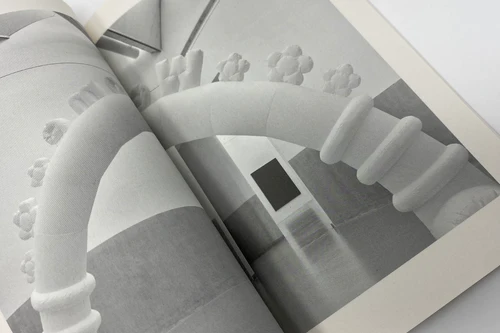
Literal descriptions of things intersperse Bosses, 2023, Ghislaine Leung’s new collection of texts: ‘Index of Services’; ‘Air Passenger Duty’; Avoidable Mortality’. They might be titles for works, such as Public Sculpture, 2018, which I encountered in Suffolk earlier this summer, a taxonomical lineup of toys from a Reading local authority lending library. Produced according to a score, it was also exhibited in ‘Fountains’ in 2022 at Simian gallery in Copenhagen, and more recently for the Turner Prize in Eastbourne.
The score, Leung writes, presents a generative way to rethink the production and circulation of sculpture within the limitations of one’s life: challenging ownership and authorship, while raising questions about when a performance begins and ends, who performs the work, and how spatial and material conditions affect its outcome.
‘I write a score,’ Leung explains early in Bosses, ‘as a parameter of how a particular work gets shown. I produced this way of working specifically because I was interested in finding a mode of production that made space for a different kind of work, a different way of working for me – something that was generative, that I could do while letting life be what it actually is.’ Synonymous with musical composition, Leung continues that scores ‘are ways to generate: they are constitutively mutable and informal, contingent on their performance’. Constituent elements of her work are assembled interdependently, Leung not necessarily being present during an installation. The challenge of writing a score for Leung becomes: ‘What might be written to maximise such contextual contingencies?’
Leung once considered context a problem, conscious of the ways in which the meaning of a work becomes unstable when it enters the world. Pushing these factors to the fore – institutional histories and conditions, her own body and, not least, the contingencies of life itself – are the limitations that constitute work and the creation of value: Leung quotes her friend and colleague, the curator and educator Ian White: ‘What there is to be jubilant about is that limit is everyone’s material and it is always here. And this is where to start.’
This application of economic thinking in her work is informed by her experiences of working at LUX, the moving-image library that has long-ensured artists’ fees for screenings and performances. This transposition of one economy to another has wide-reaching and critical repercussions; indeed, Leung’s approach shares similar conceptual sensitivities as Adam Linder’s dance works (he has instituted remuneration for dancers in the gallery informed by his experience at the Royal Ballet), or Cameron Rowland’s rental contracts for artworks pegged against carceral economies.
One interpretation of works by these artists is to consider how they assert novel commodity forms and, more pragmatically, how they intervene in real-world conditions of value creation to expose its biases and failings. Leung emerges in Bosses as a deep and optimistic artist-thinker on value and labour: ‘I wanted to think of ways that my work could address [labour] not only through striking against my own self-exploitative tendences, but actively cancelling them. To think of these as constructive issues of labour connected to market viability, visibility, and metrics. A privileging of visibility that compounds extractive forms of production and rides slipshod over informal or invalidated labours and communities.’
Leung’s work challenges the image of the contemporary artist enacting the fantasy of capitalism’s limitlessness. As the sociologist Isabell Lorey diagnosed, the artist is the virtuoso embodiment of economic independence, flexibility and creative resilience in a world of precarity that has been economized. ‘Why,’ Leung asks, ‘do I seek to exploit myself? I often choose to be my own bad boss … Given that I’m my own worst enemy, why can’t I stop seeking to collude or even be complicit in these abuses?’
Leung resolved to shift from speaking about labour relations to ‘pursuing a project of understanding how I was instituting, and what my role in instituting was – how I worked, not what the work was’. Vital to this realisation, we learn, was becoming a mother. Bosses opens with Leung’s moving account post-partum. ‘I was struck,’ she writes, ‘by how my ability to reproduce and provide care was assumed.’ Leung recalls preparing an exhibition at the same time and fighting to resist compartmentalising ‘artist’ and ‘mother’, instead opening up her practice to let it all in as a constitutive fact.
Leung makes clear that the seemingly ‘non-productive’ is as important to a work as that of distribution, exchange and consumption –an extended process of learning when to say ‘no’ (an approach that brings to mind Josef Strau’s writing on the ‘non-productive attitude’). Besides the recognition of limits, Leung has also learnt that entanglement of support is also an enabling one: ‘Freedom is often conflated with autonomy,’ she writes, ‘but dependence is perhaps less the incarcerator than the liberator. I am free with support, not without.’ Leung’s take is counter to that of Sheryl Sandberg’s corporate big-tech ‘lean in’ philosophy, often more straightforwardly defined as being a ‘girl boss’. Indeed, Dawn Foster’s rejoinder to ‘lean out’ was an invitation to consider these structural conditions as economic and social fact.
The intriguing affective blankness and literalism of Leung’s work – no, its deflectiveness – points to everything but itself. This ‘auto-factual’ mode is where the intangible values of her practice lie.
Ghislaine Leung, Bosses, Divided Publishing, 2023, 104pp, 15b&w and two col illus, pb, £11.99, 978 1 916425 00 2. Click here to purchase. Leung’s work is also shortlisted for this year’s Turner Prize, currently on display at Towner Eastbourne to 14 April.
